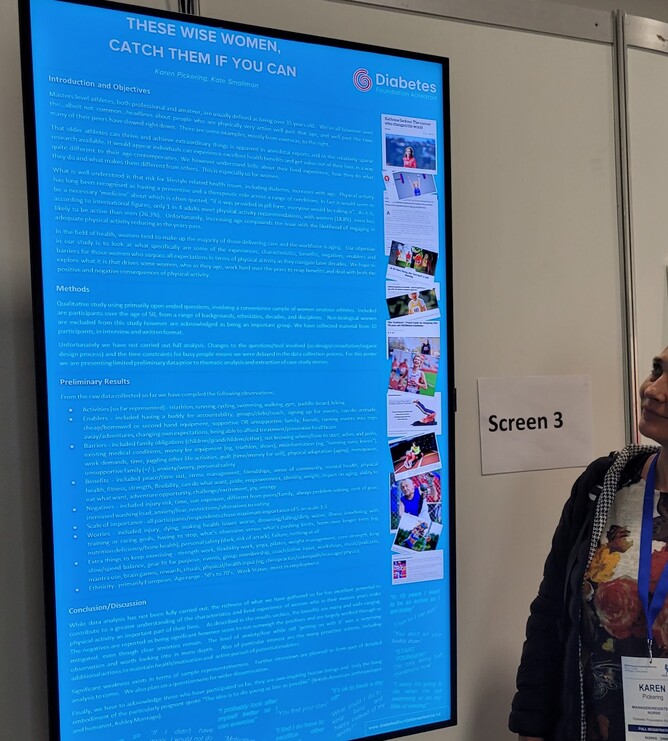Karen Pickering presented a poster on some qualitative research she and Kate Smallman were working on looking into what makes older women take on physical activity above and beyond what their contemporaries are doing. Preliminary analysis of data gathered from interviews and online questions from a small group of women over the age of 50 who do well beyond what is considered 'the usual' in terms of physical activity was put into poster format and presented at the 2023 NZSSD conference in Wellington.
The results section of the poster was:
From the raw data collected so far we have compiled the following observations:
Activities (so far represented) - triathlon, running, cycling, swimming, walking, gym, paddle-board, hiking
Enablers - included having a buddy for accountability, groups/clubs/coach, signing up for events, can-do attitude, cheap/borrowed or second hand equipment, supportive OR unsupportive family, friends, turning events into trips away/adventures, changing own expectations, being able to afford treatment/preventive healthcare
Barriers - included family obligations (children/grandchildren/other), not knowing where/how to start, aches and pains, existing medical conditions, money for equipment (eg, triathlon, shoes), misinformation (eg, “running ruins knees”), work demands, time, juggling other life activities, guilt (time/money for self), physical adaptation (aging), menopause, unsupportive family (+/-), anxiety/worry, personal safety
Benefits - included peace/time out, stress management, friendships, sense of community, mental health, physical health, fitness, strength, flexibility, can do what want, pride, empowerment, identity, weight, impact on aging, ability to eat what want, adventure opportunity, challenge/excitement, joy, energy
Negatives - included injury risk, time, sun exposure, different from peers/family, always problem solving, cost of gear, increased washing load, anxiety/fear, restrictions/alterations to eating
Scale of importance - all participants/respondents chose maximum importance of 5 on scale 1-5
Worries - included injury, dying, making health issues worse, drowning/falling/dirty water, illness interfering with training or racing goals, having to stop, what’s obsession versus what’s pushing limits, harm over longer term (eg, nutrition deficiency/bone health), personal safety (dark, risk of attack), failure, nothing at all
Extra things to keep exercising - strength work, flexibility work, yoga, pilates, weight management, core strength, long slow/speed balance, gear fit for purpose, events, group membership, coach/other input, workshops, music/podcasts, mantra use, brain games, rewards, rituals, physical/health input (eg, chiropractor/osteopath/massage/physio)
Ethnicity - primarily European. Age range - 50’s to 70’s. Work Status - most in employment.
The discussion from the poster was:
While data analysis had not been fully carried out, the richness of what was gathered so far has excellent potential to contribute to a greater understanding of the characteristics and lived experience of women who in their mature years make physical activity an important part of their lives. As described in the results section, the benefits are many and wide ranging. The negatives are reported as being significant however seem to not outweigh the positives and are largely worked through or mitigated, even though clear anxieties remain. The level of anxiety/fear while still ‘getting on with it’ was a surprising observation and worth looking into in more depth. Also of particular interest are the many proactive actions, including additional actions to maintain health/motivation and active pursuit of potential enablers.
Significant weakness exists in terms of sample representativeness. Further interviews are planned to form part of detailed analysis to come. We also plan on a questionnaire for wider dissemination.
Finally, we have to acknowledge those who have participated so far, they are awe-inspiring human beings and truly the living embodiment of the particularly poignant quote “The idea is to die young as late as possible” (British-American anthropologist and humanist, Ashley Montagu).
There are plans for extending this limited study at a later date.


